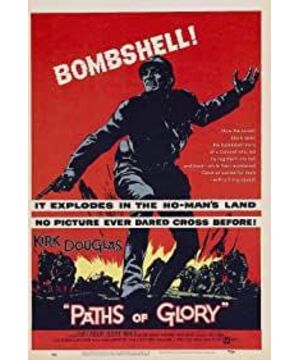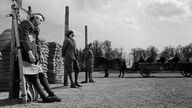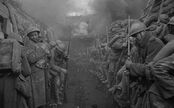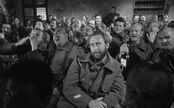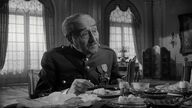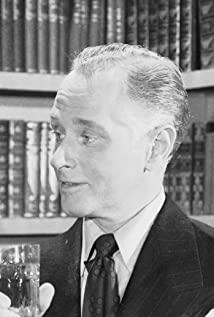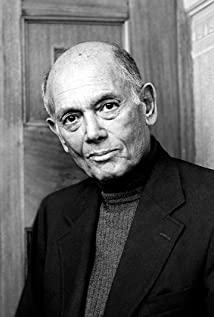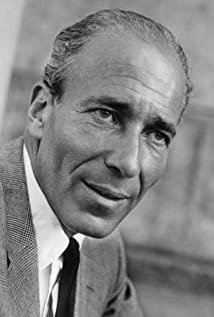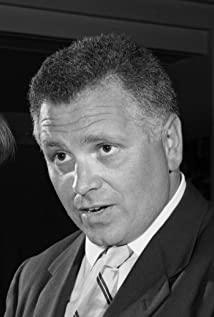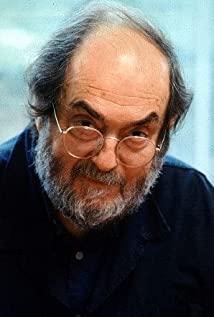Text
"Road to Glory" starring Kirk Douglas wrote in his memoir: "I said to Stanley after reading the script of "Road to Glory", "This is a movie that will definitely not make money, but we It must be photographed.”” The story tells that during the First World War, France and Germany were inextricably fought, and the French General Staff ordered an “impossible” launch against the German fortress "Anthill." As a result, the French forces had to retreat due to the disparity in combat power between the two armies, but the commanding general used "cowards and deserters" as an excuse and ordered the gun to be directed at his family. After being rejected, he still "selected." Three soldiers were sacrificed in his own mediocre decision-making. In fact, as Douglas said, because [Road to Glory] showed the cold-blooded and treacherous French generals, the French military expressed strong dissatisfaction and even called on all Europe to boycott the film. For a long time after, Switzerland also banned the film from being distributed in Switzerland on the grounds of “slandering the image of the French military”; even Germany also banned the appearance of [Route of Glory] due to pressure from France. At the Berlin Film Festival. However, there are also people who sing hymns—Italian filmmakers are very fond of this film (they awarded the best foreign language film to [Glory Road] in 1959), and the Spanish surrealist Buñuel He also said that he is a diehard of [Glory Road]. A hundred turnaround time had to go back to after [Killing] was released. Although the film didn’t make much progress at the box office, it gained a good reputation in Hollywood circles. MGM’s then-president Dol Shari also focused on Kubrick, a newcomer with unlimited potential, after some persuasion. , Shali successfully recruited "Harris Kubrick Production Company" under his command. With the strong backing of MGM, Kubrick and Harris were naturally full of confidence in the future and immediately thought about the direction of the new film. Perhaps it was a fascination with war themes combined with [Fear and Desire]. Kubrick wanted to make another war movie. He remembered a novel "Road to Glory" that he had read in high school. The questioning of the war fascinated Kubrick. With the strong support of Harris, they proposed the shooting plan of [Glorious Road] to Dole Shari. But unfortunately, at that time, several war films released by MGM were all knocked out at the box office. Where did Shali dare to pick up this hot potato and immediately rejected Kubrick's proposal. However, obedience has never been Kubrick’s style. On the surface, he accepted Shari’s proposal and chose his real name in MGM’s library. The Secret of "The Secret" of the novel was adapted, but secretly, he continued to tinker with the adaptation of "Road to Glory". On the day of submission, Kubrick failed to complete the adaptation of "The Unlockable Secret", not to mention that he was forced to terminate the cooperation with MGM because of the disclosure of his private operation of "Road to Glory". Coupled with the fact that Dole Shari was also fired during a personnel change, what happened to Kubrick after joining MGM was like: midnight had come before Hindrella tried on the crystal shoes in front of the prince. But this actually made Kubrick's thinking become clearer-first devote himself to the adaptation of "Road to Glory" and let's talk about it! After the adaptation was completed, it was natural to raise the funding for the sponsorship, but this did not stop Kubrick, who had been hands-on since his debut. He asked some friends to play the role of French soldiers and took a "pseudo-still photo" with the woods as the background. On the cover of the script and show it to United American. Lianmei was not very tempted at the beginning, and after several difficulties, [Glory Road] was almost dead. Fortunately, "Savior" Kirk Douglas appeared. As early as after watching [Killing], Douglas was impressed by Kubrick's talent. After meeting with Kubrick, he readily agreed to cooperate and said the paragraph at the beginning of this article. Taunting that the free army is the tomb of freedom, the personalities of the soldiers are restricted, and the original independent individuals are reduced to cannon fodder one after another in the war, such as Corporal Paris who was scheduled to carry out reconnaissance missions and Le Génet, who was killed by his own people, Another example is the entire group that was ordered to assault the "anthill". Kubrick is a fan of chess. In his [Killing], there has been a chess scene. The black and white lattice floor of the military court in [Glory Road] is like a chess board, and the soldiers on trial stand on it. It is like a chess piece that can be manipulated by others, and these hints deepen the "deprived sense of freedom." And Kubrick's mockery of freedom in [Road to Glory] is far more than that. At the beginning, when General Brollard conveyed the General Staff's resolution to General Milo, Milo had the freedom to refuse, but the possibility of rejection was defeated because he failed to resist the provocation of Li Honor. A similar scene immediately appeared: Miró gave Colonel Dax an order to attack the "anthill". Although Dax also has the freedom of choice-accepting the task or being dismissed, he obviously does not want others to take his hand. To die, the choice became vain for him. In the bridge section reviewed before the war, Kubrick emphatically showed Dax's dignified and helpless look, and from Dax's perspective, all soldiers curled up in the trenches were about to die. In the movie, the sense of glory and responsibility have become the murderers of freedom. , The chat and laughter between the generals affected the lives and deaths of thousands of people, and Kubrick made a powerful accusation against the absurdity of the war. The contrast in the ridicule of equality [Road to Glory] runs through the film: General Miró’s luxurious office and the barren and muddy battlefields on the front line, and General Miró’s ease of reviewing the soldiers (the soundtrack is very funny and Miró is like a circus performance. The clown of the time) and the heavy nervousness during the inspection with Colonel Dax (only the explosion of the shell can be heard during the whole process), the lively dance party and the cell where the soldier was placed before the death sentence... Kubrick tried his best to create a contrast To show the different situations between the upper and lower levels, this tacit injustice is going on at the same time as the war, and the ruthless, shameless, and rascal side of human nature is infinitely magnified through his lens. Three soldiers were selected from three companies for trial, and the way they were selected is ironic to the extreme: one is by lottery; one is because of "unpopularity"; the other is because of holding hands. Have the boss's handle. In the wonderful court scenes of the film, the design of the lines is even more exquisite, and the presiding judge and the defense lawyer who "just convict a guilty rash" and the defendants who "one is wronged but have to plead guilty" are between The dialogue was humorous, and it was so dark humor. You see, even the courts that represent justice and justice are just a cutscene. [The Road to Glory] not only demonstrates the cruelty of war, but also crushes justice and human rights. As the absolute protagonist of the whole film, Colonel Boai Dax has both idealist romance and military mission. Therefore, when he sees the world and the faces of the generals step by step, he becomes In a tragic role, he can neither pull away nor resist against this system, and his final angry roar at Brollard also appears quite weak. In the scene where he led his subordinates marching toward the "anthill", Kirk Douglas whistled and headed towards the destination with his gun high. However, due to the disparity in military power, he was killed and injured, which also hinted that he would eventually fall into idealism. It is impossible to move forward on the road, just like the summary statement in the court-even if it is impassioned and well-founded, but the next shot Kubrick will be given to the gunmen who are preparing to execute the death penalty-directly order Dax All efforts made by the colonel to save the three subordinates came to naught. In [Road to Glory], justice has not been done, sympathy and compassion have not been released. It shows a realistic, indifferent, and utilitarian world, where kindness is buried, true voices cannot be spread, and all attempts to save The actions all ended in failure. The staff’s decision is due to pressure (so to make up for it) or greed (So eager for quick success and quick gains is recognized), Kubrick's spearhead even points to the entire society that creates public opinion pressure. In addition, there is no enemy in the whole film. This suggestion that "death comes from oneself" is also in the same line as Kubrick's theme that "driven by fear and desire, oneself often sends oneself to a dead end". In order to pursue the truth, Kubrick painstakingly studied the history of World War I and the details of the trench warfare. He then moved his understanding of the battlefield to the shooting site, including the aircraft wreck seen in the reconnaissance section, which was also Ku Brick’s elaborately designed "props", he said, were to embody the cruelty of the battlefield (the plane was still smoking). In addition, for the realistic effect of the explosion, when shooting explosion scenes, Kubrick always puts quality first, and for ordinary directors to shoot explosion scenes once and again, Kubrick will have to shoot until he is satisfied. In addition, Kubrick’s extreme refinement of details is reflected in the "battlefield" that was built, as he said in an interview with Newsweek in 1957: "After digging the craters and trenches, We placed a lot of small props there-discarded guns scattered in the crater, soldiers' uniforms, etc. Although you may not see them, you can feel them." Adolf Mengio once said, "Kubrick will become one of the ten best directors." After [Glory Road], it can be said that Kubrick has infinitely approached this title. Published in the March 2014 issue of "Watching Movies Midnight Show" Many small props-discarded guns scattered in the crater, soldiers' uniforms, etc. Although you may not see them, you can feel them. "Adolf Mengio, who played General Brollard in the film, once said, "Kubrick will become one of the ten best directors." "[The Glory Road] After that, it can be said that Kubrick has approached this title infinitely. Published in the March 2014 issue of "Watching Movies·Midnight Field" Many small props-discarded guns scattered in the crater, soldiers' uniforms, etc. Although you may not see them, you can feel them. "Adolf Mengio, who played General Brollard in the film, once said, "Kubrick will become one of the ten best directors." "[The Glory Road] After that, it can be said that Kubrick has approached this title infinitely. Published in the March 2014 issue of "Watching Movies·Midnight Field"
View more about Paths of Glory reviews


